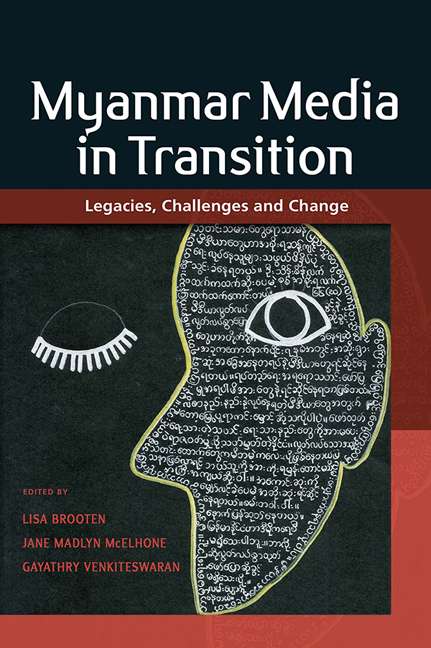Book contents
- Frontmatter
- Contents
- Contributors and Editors
- Burma or Myanmar? A Note on Terminology
- 1 Introduction: Myanmar Media Historically and the Challenges of Transition
- Part I Structural Constraints and Opportunities
- Part II Journalism in Transition
- Part III Creative Expression
- 14 Myanmar's Pop Music Industry in Transition
- 15 New Video Generation: The Myanmar Motion Picture Industry in 2017
- 16 Films for Dignity
- 17 A “Fierce” Fear: Literature and Loathing after the Junta
- Part IV Society and Media
- Epilogue: Media Studies in Myanmar – Where Do We Go from Here?
- Index
16 - Films for Dignity
from Part III - Creative Expression
Published online by Cambridge University Press: 07 September 2019
- Frontmatter
- Contents
- Contributors and Editors
- Burma or Myanmar? A Note on Terminology
- 1 Introduction: Myanmar Media Historically and the Challenges of Transition
- Part I Structural Constraints and Opportunities
- Part II Journalism in Transition
- Part III Creative Expression
- 14 Myanmar's Pop Music Industry in Transition
- 15 New Video Generation: The Myanmar Motion Picture Industry in 2017
- 16 Films for Dignity
- 17 A “Fierce” Fear: Literature and Loathing after the Junta
- Part IV Society and Media
- Epilogue: Media Studies in Myanmar – Where Do We Go from Here?
- Index
Summary
The moon is shining, some villagers are laughing out loud, and others weeping while they sit together in a village compound watching human rights films. A young girl stands up and reads Article 26, “the right to education”, from a printed handout of the thirty articles of the Universal Declaration of Human Rights. If this were pre-2010, it would have been a dream. In 2004 a group of young men in Yangon were arrested because they handed out human rights flyers in commemoration of human rights day (VOA 2004). For almost five decades while the country was under military rule, even the words “human rights” were forbidden in public spaces. The dream has come true today, but it did not come effortlessly.
In 2013 I became the co-organizer of the Human Rights, Human Dignity Film Festival in Yangon. We organized the festival for a simple reason — we were very suspicious of the political reform process initiated by the Thein Sein administration, the transformed military government. Like many of our fellow citizens, we wanted to push the boundaries of the so-called quasi-civilian rule, by using the human rights film festival as a tool. That's how Myanmar's first international human rights film festival came to be. The landmark human rights event was held in Yangon for five years. A mobile film festival that brought human rights films to audiences across Myanmar also grew in scope.
The abolition of pre-publication censorship in Myanmar resulted in a certain level of media freedom for the print media, but not for the film industry. In 2014 the film censorship board was recreated as the “Film Classification Board” under the Ministry of Information. In order to screen human rights films in downtown cinemas, authorization was required from the Film Classification Board. Without that official piece of paper, none of the commercial entertainment companies would allow us to host the human rights film festival in their theatres.
Therefore, in order to keep the festival running, we did not select overly sensitive films. That might be called self-censorship; yet, in 2013, the first year of the festival, all films submitted to the Film Classification Board — including a documentary film about human rights violations in Myanmar prisons based on the story of a political prisoner — got the go-ahead to be publicly screened.
- Type
- Chapter
- Information
- Myanmar Media in TransitionLegacies, Challenges and Change, pp. 307 - 314Publisher: ISEAS–Yusof Ishak InstitutePrint publication year: 2019



